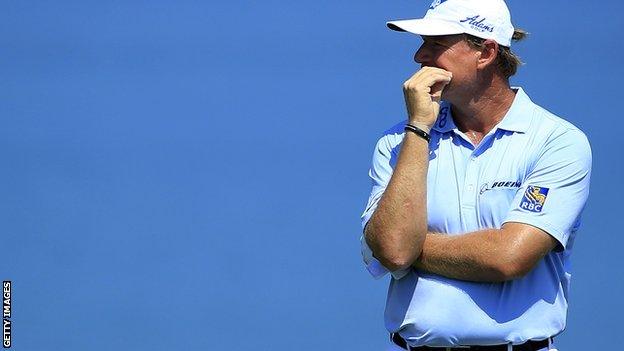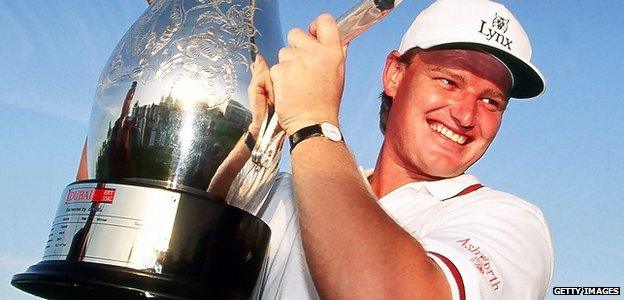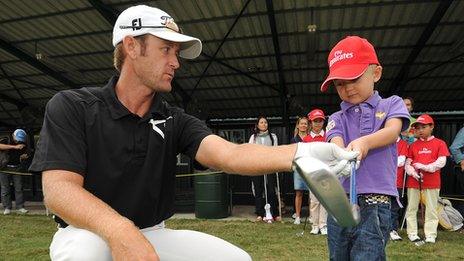Ernie Els seeks formula to rekindle former glories
- Published
- comments

Ernie Els has won four majors in his career
The irony is hard to ignore. Jordan Spieth's latest extraordinary performance helped remind us of Ernie Els' greatness, while the popular veteran was suffering more ignominy in his native South Africa.
Spieth remains deadly accurate on the greens but Els struggles to hole the most straightforward putts. It is a sad scenario, yet the 46-year-old's enduring love of this maddening game can only be admired.
Back in 2003, Els shot 31 under par to win the Mercedes Championship in Hawaii. It became the benchmark for Spieth to aim at last weekend as he romped to his eight-stroke victory in the PGA Tour's Champions Tournament.
The young Texan came up only a stroke shy of Els' record as he laid down an impressive marker for the coming year. Just 22, he now has seven titles to his name and more will surely be added to the list.

Els won the Mercedes Championship at the Kapalua Resort, Hawaii in 2003 - 13 years later, Spieth emulates Els
But what does 2016 hold for the 46-year-old Els?
These are tough times for the four-time major champion as he grapples with those demons on the greens.
Els was once such an elegant putter. His poise matched the grace, tempo and power of his long game.
These qualities were evident to anyone who watched him win the 1994 and 1997 US Opens. On the tough layouts at Oakmont and Congressional, Els made the game look ridiculously easy.
He was just 24 when he grabbed the first of those majors and back then anyone suggesting he would win only three more would have been given short shrift.
Of course, Tiger Woods had yet to emerge and Els became one of the 14-time major champion's first big rivals to be taken down.

Els is known as "The Big Easy" because of his imposing physical stature (he stands 6ft 3in) along with his fluid golf swing
Regular defeats at Woods' hands inflicted serious damage to the South African's golfing psyche. However, he still won the 2002 Open at Muirfield before taking advantage of Adam Scott's late capitulation to claim a second claret jug a decade later.
This week I find myself recalling events of a year earlier, at Royal St George's. There I caught sight of Els battling through the wind and rain of the 2011 Championship, totally out of contention.
The thought struck me: "Why is he bothering?"
After all, he was about to celebrate his 42nd birthday having enjoyed a largely glittering career. He had made a fortune and there must be more to his life than this.
But that discounted the competitive instincts that put the millions in Els' bank account. It didn't take account of a fire that still burned inside and a year later his persistence was more than vindicated with his victory at Royal Lytham.

Els rose to 15th in the world rankings after winning the 2012 Open Championship
It was achieved with a belly-putter wedged into his midriff, a method that brought him a second life on the greens. It is a technique no longer available, with the ban on anchored putting having been brought in at the start of this year.
The R&A and the United States Golf Association (USGA) wanted to remove a crucial crutch from those unable to control involuntary hand spasms often acquired from a mileage of missed putts.
So the governing bodies legislated to sort the wheat from the chaff, handing an advantage to those players who don't need to attach putters to a pivot point to make a stroke.
Manfully Els has sought to embrace the demands of the new rules, but ditching the belly putter has been a painful experience.
How embarrassing it must have been to become an internet sensation when he failed to hit the hole from short range during last autumn's Alfred Dunhill Links Championship.

Els is currently ranked 194th in the world
An unforgiving Twittersphere called it "the worst putt ever"., external
Those who witnessed the Carnoustie calamity first hand were more sympathetic, including Ken Brown, the author of the excellent book 'One Putt' which examines the art of this most frustrating aspect of the game.
"It is gut wrenching isn't it," Brown said during his television commentary. "Especially when you have been as good as he has."
The former European Ryder Cup player notes in his book: "It is very difficult to achieve consistency at impact without your hands working in harmony."
Alas there was little melody in the movement of Els' mitts last week when he missed the cut at the South African Open. The second round ended with a miserable three putt.
Remember this is someone with 70 worldwide wins to his name and still he will persevere.
"I love the game too much," he insisted.

Els hits his tee shot on the 13th hole during the first round of the BMW South African Open Championship
"I'm not going to stop. I'm going to get over this by using the cross-handed method and still have fun out there."
Els is down to 194 in the world rankings. These are desperate times; the game is anything but easy and we can only wish him well.
Thankfully the competitive fires still burn as he continues to seek the formula of former glories.
- Published11 January 2016

- Published10 January 2016

- Published10 January 2016

- Published28 September 2018

- Published19 July 2016
